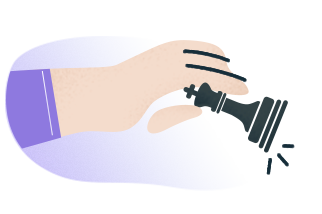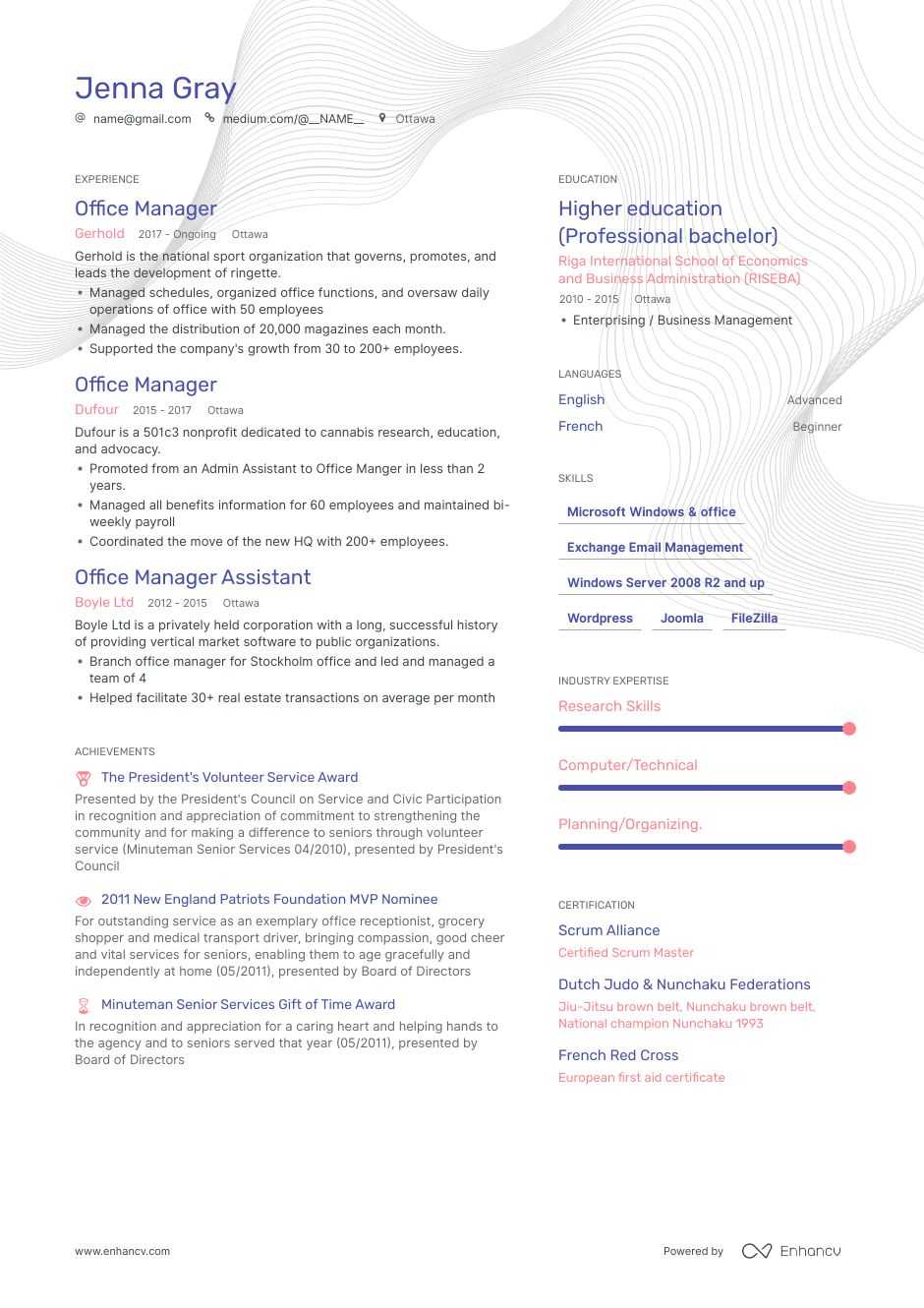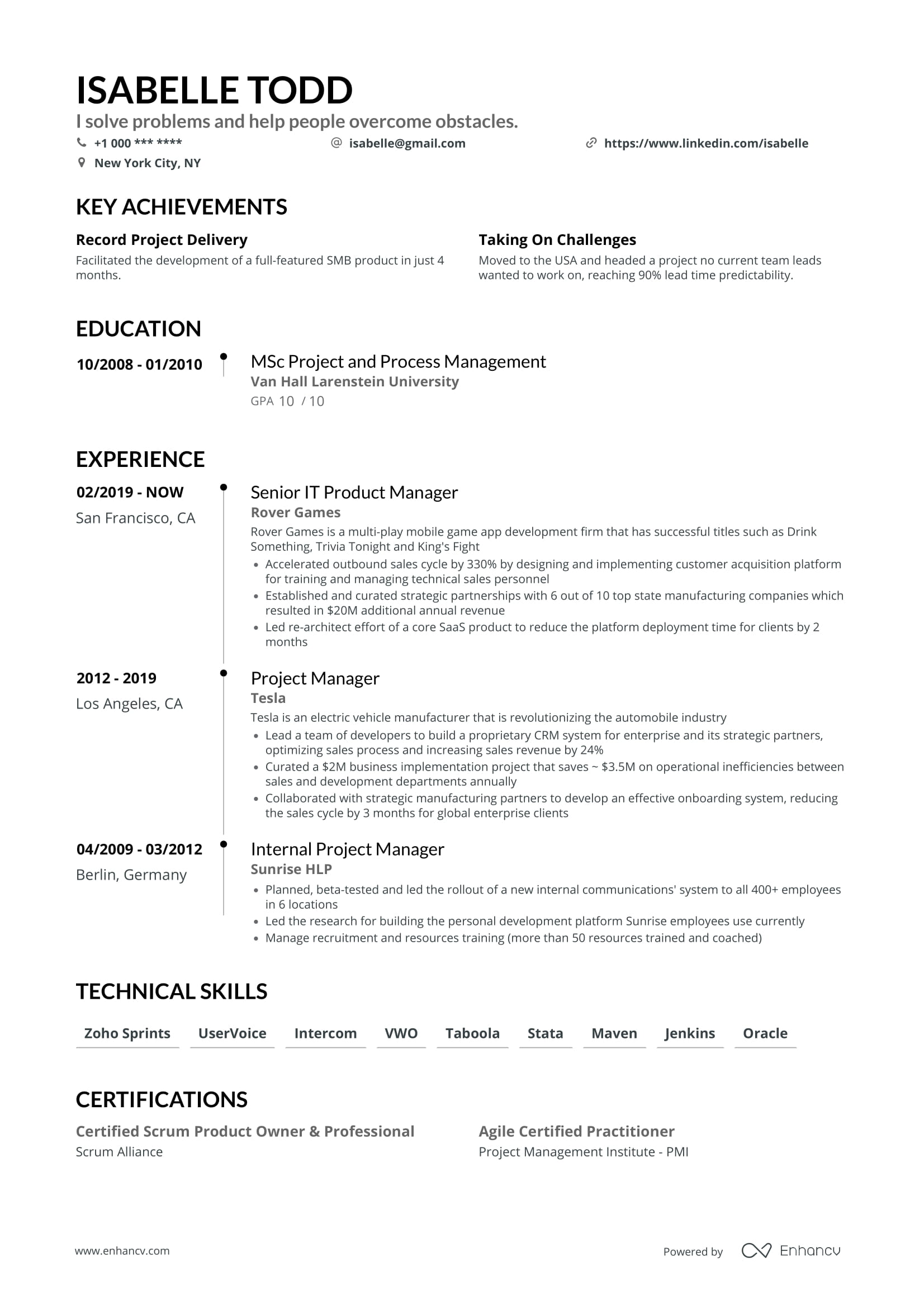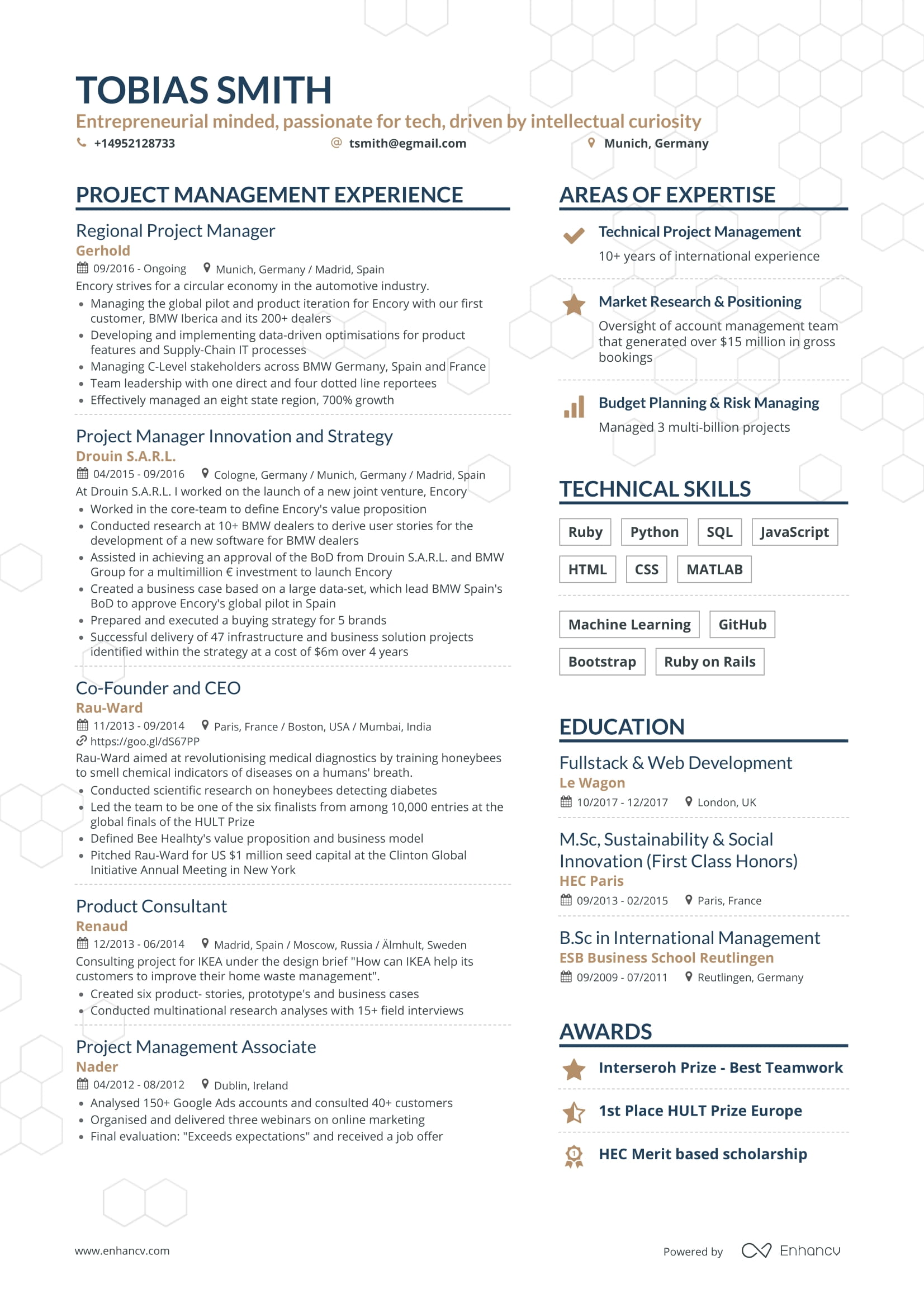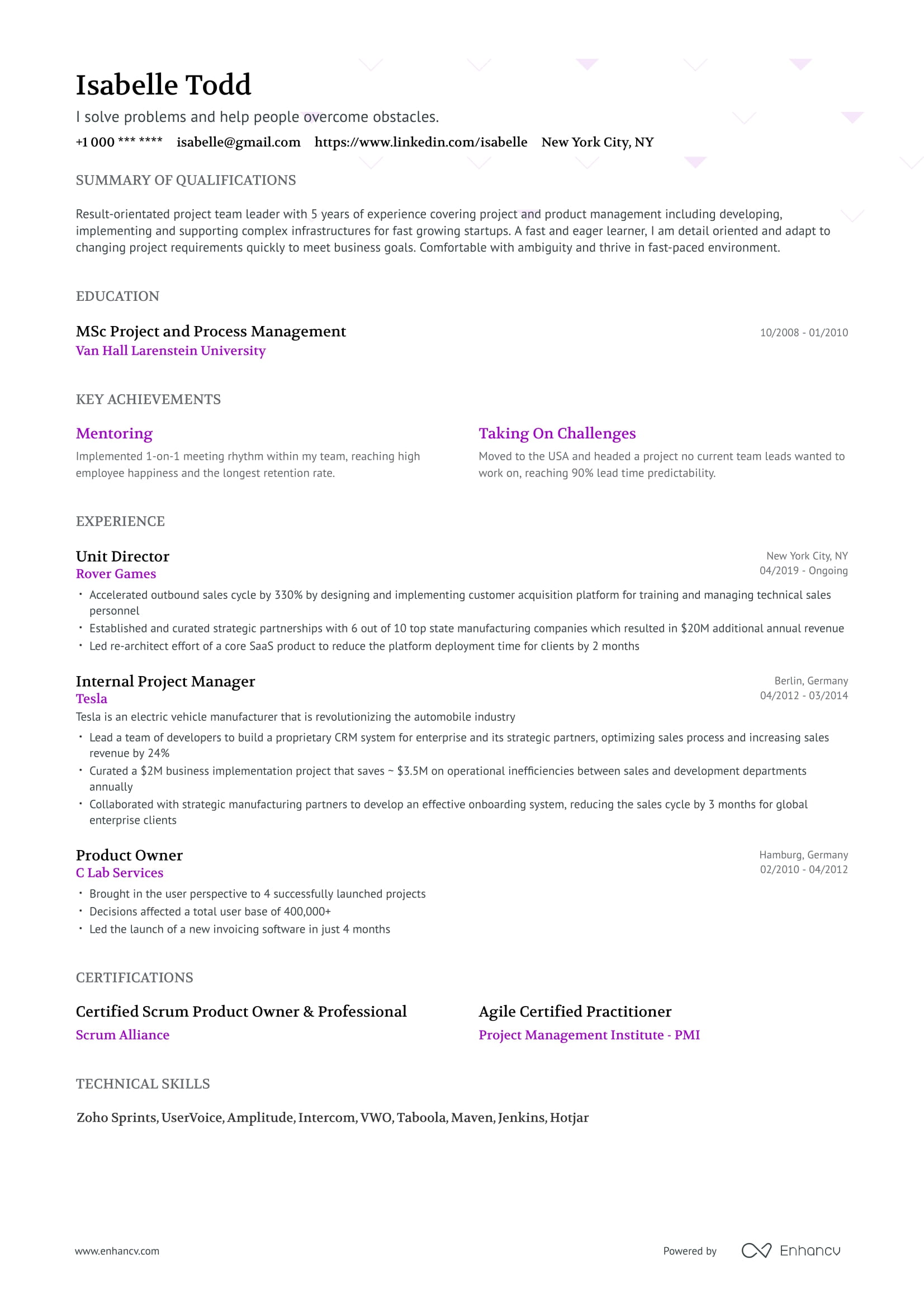Example Office Manager Resume - Browse more resume templates and build a stand-out resume
Office managers are the glue that hold a business together. They streamline office operations, help employees stay organized, and increase workplace productivity.
You know the value you can bring to an organization...but does a recruiter?
Sometimes it can feel like you're sending your office manager resume off into an empty abyss.
You know the feeling.
You've applied to job after job but you're just not hearing back. That can be frustrating—or even downright discouraging.
Don’t worry. Job searching doesn’t have to be this way.
In this guide, we’ll provide office manager resume samples and cover top tips and tricks for creating an eye-catching resume.
What you’ll learn here
- What a professional office manager resume looks like (with templates)
- Which sections you should include on your resume
- What recruiters look for in an office manager’s resume
- How to make your resume stand out
- The most common mistake people make when writing their resumes
Office Manager resume example
How to write an Office Manager resume
Office management is a competitive field. According to the Bureau of Labor Statistics, jobs for office managers are anticipated togrow by 10% from now until 2026.
That means job searching won't be a walk in the park. Recruiters are likely receiving hundreds of applications for an open office manager position.
And there’s nothing worse than putting in a ton of time into an application only to get an email saying they’re moving forward with another applicant.
The good news is, job searching doesn't have to be this way. The reason you're not hearing back isn't because of you (or your lack of ability for that matter). It's because your resume isn't impressing recruiters.
That’s where we come in. We know exactly what recruiters look for in an office manager resume. We've studied what works and what doesn't when it comes to resume writing.
And now, we're here to share that knowledge with you. Let's jump in. To start, you’ll want to ensure your resume includes the right sections.
Here are the top Office Manager resume sections
- Header section: Here you should include your name and contact information. You don’t need your address. Just an email and phone number to reach you at.
- Summary section: This will be 2-3 sentences showing why you’re the right fit for the job. Be as specific as possible.
- Experience section: In your experience section, you’ll want to focus on your job achievements, not your day-to-day responsibilities.
- Education section:In this section, you'll include your college/university and your area of study. If you’re a recent grad, you can also include relevant coursework.
- Skills section: Here, you'll add industry skills as well as soft skills that help you succeed at work.
This is what recruiters want to see in an Office Manager resume
- How you improve the day-to-day operations of an office
- That you want to work for their office, not just any office
- That you have the necessary administrative and customer service skills needed in an office management position
- What makes you unique. Why should they hire you over someone else?
Once you’ve outlined all your resume sections, it’s time to start adding in content. The best place to start is the header.
What makes an Office Manager resume header work
A strong resume header is incredibly important. If it's formatted incorrectly—or if it doesn't include the right information—your resume won't get a second look. It's a relatively simple section but getting it right is imperative.
Keep it concise and easy to read.
2 Office Manager resume header examples
This header section is unprofessional. The email address looks like it was created in 7th grade. Be sure to use emails that only include your name.
This header is much more professional looking. It also includes a link so the hiring manager can easily click to learn more about her. These might seem like small or trivial differences. But the truth is, they make all the difference in the world.
Once you’ve completed your header section, start writing your resume summary.
Here’s how to reinvent the summary section of your Office Manager resume
Hiring managers look, on average, at each resume for just six seconds. They don't have time to read every resume in-depth. But they do have time to read your resume summary.
So you need to make a strong first impression. Here's how to do that.
2 Office Manager resume summary examples
This summary section is pretty generic. It doesn't mention any achievements, which makes it nothing more than a few sentences filled with buzzwords.
This summary is much more unique. A recruiter can quickly see how long they've worked in the field and what kind of things they can accomplish.
After you’ve finished your summary section, move on to the experience section.
Office Manager experience examples that make your resume pop
The experience section of your resume is arguably the most important. But it's also the section that people make the most mistakes in.
It might be tempting to use the bullet points to list your daily job responsibilities. But that's doing yourself a huge disservice. Recruiters know what an office manager does. They probably helped write the job description.
Instead, use this section to list your accomplishments and contributions to previous employers. That way, recruiters get a sense of what kind of value you can bring to their organization.
Here's the right and wrong way to write your office manager resume bullet points.
This experience section is essentially just a summary of what an office manager does. It doesn't give a recruiter any sense of how good this candidate is at their job.
Sure, they might have relevant experience, but that doesn't mean they're going to make any real difference at their company.
This experience section is much more results-oriented. By focusing on quantified achievements, recruiters will know exactly what kind of value you bring.
A recruiter is much more likely to call this candidate, as opposed to a candidate who simply lists their responsibilities.
After you've finished adding in your achievements, it's time to focus on your skills section.
How a skill section can help your office manager resume stand out
An office manager must possess both soft and hard skills to succeed in their job. So it's important to include both on your resume.
Hard skills refer to industry-specific skills or software. For a medical office manager, for example, this could include something like Easy Clinic. Easy Clinic is a scheduling software for hospitals and clinics.
A soft skill, on the other hand, refers to interpersonal strengths. This could be something like reliability. Soft skills are best demonstrated through on-the-job examples.
How to list tech skills on your resume
Adding your office manager skills like this is a great option for listing your hard skills. Many companies use software that scan resumes for keywords so be sure to cross-match your skills to the job posting. Otherwise, your resume could be discarded before a recruiter even sees it.
Hard / Technical Skills List for Office Manager Resumes
- Microsoft Office Suite
- Quickbooks
- Scheduling
- Calendly
- Inventory management
- Budgeting
- Reporting
- Records management
- Mail handling
How to describe soft skills on your resume
Soft skills are best demonstrated with real-world examples. If you simply list them, they don't mean much.
Soft Skills List for Office Manager Resumes
- Responsibility
- Organization
- Reliability
- Communication
- Time management
- Teamwork
- Empathy
- Positivity
- Flexibility
- Critical Thinking
- Attention to Detail
- Emotional Intelligence
Now that you’re finished with your skills section, let’s learn more about the right way to write your education section
Resume education section - do you really need it?
Unless you’re a student or recent graduate, your experience section should be pretty brief. You really only need your college/university and your major.
You don’t need to list your GPA or graduation year unless you think that it will make you more competitive.
3 certificate ideas for your Office Manager resume
Certifications are a fantastic way to set yourself apart from other candidates. They’re certainly not required but they do make you more competitive.
Top 3 Office Manager certificates for your resume
Key takeaways from writing a good Office Manager resume
- Your resume needs to include the right sections. This includes a header, summary, experience, education, and skills section at very least.
- You need a resume template that's eye-catching. For that reason, you might want to skip Microsoft Word to write your resume.
- In the experience section, you should focus on your past achievement not daily responsibilities. A recruiter knows what an office manager does.
- Soft skills are best demonstrated through real-world examples. Leadership means nothing if you don't provide any context.
- Focus on what makes you unique. Generic statements are the biggest mistake people make when writing their resumes.
